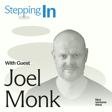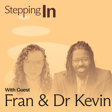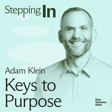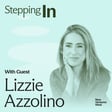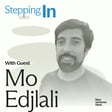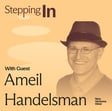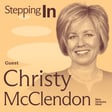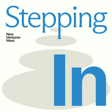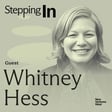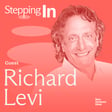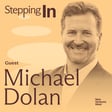Become a Creator today!Start creating today - Share your story with the world!
Start for free
00:00:00
00:00:01

Embodiment Frees Us
Apple PodcastsAmazon MusicYouTubeSpotify
Anne Egseth, NVW graduate and trained actor, joins Adam in this engaging conversation to speak to what can open for us and our clients when we begin to be present in our bodies. They also discuss myths around embodiment and common ways of accessing greater somatic intelligence.
Here are some of the topics covered in the Stepping In podcast episode How Embodiment Frees Us:
- Understanding the body’s role in somatic work, acknowle
Transcript
Introduction to Stepping In Podcast
00:00:11
Speaker
Hello, this is Adam Klein, Global Graduate Director, faculty member at New Ventures West. This is episode 17 of our podcast, Stepping In, a podcast where we delve into how integral coaching can address some of the most pressing issues we face as individuals, as communities, and as stewards of our planet.
Meet Anna Eggseth: Integral Coach & Movement Teacher
00:00:30
Speaker
In this episode, I talk with Anna Eggseth about incorporating the body in coaching and common misconceptions about somatic work. Anna is an integral coach and teacher of conscious movement. And prior to that, she worked as a professional actress and trained actors. Now, on to my conversation with Anna.
The Somatic: Simplicity & Humanity
00:00:50
Speaker
You know, I love that we have these conversations, but it points to
00:00:55
Speaker
need to assert, not assert, but to acknowledge and bring forth and sort of blind spots of the body of them. Somatic, what is the somatic? I mean, it's a fancy word, but we're describing something very simple and human here. And it seems to me that
00:01:16
Speaker
there is increased interest in talking about, you know, maybe we need to talk about it and have concepts about it for a long time and that makes it more available.
00:01:28
Speaker
So I'm so happy that the coaching community is in leadership development. So the somatic is becoming such a big, there's a lot of attention on it.
Integrating the Body in Education & Culture
00:01:41
Speaker
And I guess it's just maybe time to look at the way the body and the soul and the shadow has been suppressed for millennia and then how split off we are and how
00:01:57
Speaker
much time it might take and attention it might take to start to integrate and heal this cultural split away from the body. But I guess we, you know, this is what we're talking about. How does the body show up in coaching? How does it show up in culture? How does it show up in school where my girl goes where PE, you know, they don't have it because they don't have the money for it.
00:02:25
Speaker
It's there's so much cognitive focus. And I guess we're so scared on some levels of the body or the life of the body of entering that experiential realm where things are not so easy to control. And for this is one of the things I'm really curious about.
00:02:47
Speaker
for you is when you're working with folks, this is new. So they are like, they have kind of a deer in the headlights kind of look like. Well, I'm not really sure what you're talking about. Absolutely. Yes. That might very well happen. Yes. And maybe some people who are listening to this, maybe their experience. So what's your way of supporting people if that's their starting place?
00:03:15
Speaker
I feel we can always pay attention to something. And the main thing for me is to start to guide someone's attention because we're working with attention into the body.
Guiding Attention into the Body
00:03:32
Speaker
Whatever the state of that body is in that moment, we can notice whether we hold our breaths.
00:03:40
Speaker
whether we have a lot of tension in the body, we can notice the shape of our body. So it's noticing what is true in that moment, in that body. And if it's a group, it might be harder because you're teaching to very different levels of embodiment.
00:04:01
Speaker
So to be able to both invite an awareness of tension, breath, shape, so we can start quite externally, how that affects one's experience of what is happening. And then once that's, one can make some little discoveries, you know, if I breathe more deeply, then I feel a little bit more, that can be
00:04:28
Speaker
that can be the discovery of the day for someone, whereas someone who's a little bit more embodied and has got some agency over tension in the body, for instance, can start to discover the felt senses, the qualities that in my experience open up when some of the holding patterns or the more external tensions start to release. So it's
00:04:55
Speaker
It might be supporting someone just coming into the body and it might be supporting someone to articulate a more subtle sense of embodiment or connection.
00:05:10
Speaker
And for some people, that might be Greek or not make sense. And for others, that's the reality of experiencing qualities might be completely normal.
Embodied Narratives & History
00:05:24
Speaker
And, you know, in a room, all of those levels will coexist. Well, the areas you mentioned was paying attention to our shapes. I'm wondering if you could say for people who that's new for what you
00:05:38
Speaker
to say a little bit more about that, like what do you mean by shape? So as it's beautifully taught in the New Venture West model, how our narratives are embodied, how our our history is inscribed in our in our body, how the way as we grew up, the strategies we
00:06:03
Speaker
we developed in order to get enough connection or feel safe or feel dignified those strategies got woven into our new biology and they basically shape us are the way we hold ourselves together and just to pay attention to how what kind of body what kind of shape we are in whether it's a
00:06:34
Speaker
collapsed body, for instance, how that makes us view another person or ourselves or possibilities, I think, to bring experientially those shapes into focus. From what I see, it's very accessible when we do those exercises and experientially
00:07:00
Speaker
It doesn't need a lot of conceptual framework for people to experience how the world looks so different if I'm in a more centered body or if I tense up and I'm in a more defended body. It's so available, the experience. And then to be able to articulate that, I think that's...
00:07:25
Speaker
something, a place where everyone can easily start to pay attention, the connection between my shape and my way of being. Yeah, I think this, like I'm with you in the New Ventures West program when we have this day, this seems like a really powerful way for people paying attention to, like you said, that my collapsed meaning is my like shoulders rounded forward and my concave or
00:07:54
Speaker
some of the other distinctions you have brought in or am I inflated where it just is really puffed up and or am I the person who like if we're in a sitting situation kind of always leaning back in my chair and then the kind of slouched posture right yes and then seeing what if I change that then what am I what do I notice
00:08:19
Speaker
Yes exactly and I love it when we work with the vertical line and in the body we take ourselves off the vertical line in some way leaning forward or backwards and when people come back to the vertical line how there's always
00:08:37
Speaker
description of feeling space and availability. And I love that when people articulate, I feel space. I feel my body has got more space in it. And that's, I think that's a very useful observation. Picking up on this, what you're talking about, people feeling or experiencing more space.
Human Connection through Somatic Work
00:09:03
Speaker
What else have you had people report to you as
00:09:06
Speaker
what's become available to them or what's opened up to them as a result of becoming more present in their body or developing their somatic awareness. What have you seen people say or experience?
00:09:27
Speaker
So when when I work with people either one to one or in groups, or I was teaching classes here in San Diego for two years, and what people would say is after the somatic work is that they feel more connected to themselves and then to to other into life.
00:09:51
Speaker
And one person would always say after my classes or after having moved, suddenly everyone looks more human. I feel more human and other people look more human. And I think that's an experience when we move into the body. It's like, oh, there's something very humanizing about it.
Misconceptions about Somatic Work
00:10:15
Speaker
So what are misconceptions people have
00:10:20
Speaker
about the body or somatic work? Well often when I say to people that I do somatic training days they go blank trying to figure out what somatic means and when I explain a little bit I think most people think it's for exercising or for learning a movement technique or for
00:10:45
Speaker
being fit or for moving more gracefully or and there's so I try to explain that that might be part of it but it's also an investigation into into the way we are in our bodies the way we live in our bodies so it's not so much working on the body or with the body but through the body and
00:11:14
Speaker
That might take a little bit of explaining to framing for that to make sense. Yeah, I love this distinction, what you said. It's not working on the body. Because I think, like I was saying, sometimes when I'm reviewing students' homework, that's their understanding of it is I need to work on the body or I need my clients to work on the body, meaning
00:11:42
Speaker
exercise and sleep and food, which are important. But this is much bigger than that. Yes, exactly. So it feels to me like there's this bottom up way of understanding and processing and being in life, which is maybe more direct and might use more symbolic language.
Bridging Cultural Gaps through Somatics
00:12:06
Speaker
And then there's this top down, which might be more linear. And it feels to me like
00:12:14
Speaker
What's emerging is this need in that culture and in us to hook those two up. And we cannot leave out either of them. And hopefully that's, you know, there are rumblings everywhere in the body and the soul, the shadow. Maybe that's what is happening, this need to bridge that split. And I guess the work we do individually
00:12:44
Speaker
in terms of somatic development is part of that. It can be a great silent activism to pay attention to one's breath and breathing in a room full of people where if we breathe consciously and deeply that might silently affect the bodies and the breathing patterns of others.
Science Validating Ancient Somatic Practices
00:13:08
Speaker
So there might be teeny little
00:13:11
Speaker
things um but there's it's a place to start to bring some of this into into awareness into life like there's things we can do in our body that affects um the world around us yeah i'm loving that yes that seemingly small innocuous things do have an impact and uh for the for those who start with the mind first and
00:13:41
Speaker
need to be convinced how science is being able to show that this is actually true, what people have been saying all along that. Mirror neurons, all of these things we have. Which is wonderful as well. It's kind of a top-down linking with what dancers and actors and body workers and meditators have been saying from an experiential bottom-up way. They're sort of coming together and validating each other, I guess.
00:14:11
Speaker
Yeah, yeah, yeah. Fantastic. So I'll put you on the spot a little bit. Mm-hmm. Because we've been, I've been asking you questions about describing it. Mm-hmm. Now I'm wondering about if you were to speak from, to give people a flavor for it, of like, what is it like to be, have our attention in our body and to speak from there? So to have you walk us through, what is it like for you when you're present to what
00:14:40
Speaker
is in your body now what's what would you report from there?
Presence and Expression from the Body
00:14:44
Speaker
So when I'm feeling into what's present for me now I'm aware of my my belly and I'm aware of sort of regulating myself so I'm sending my breath down in my belly and I'm tuning into our relationship and I can feel support from your embodied presence so that
00:15:08
Speaker
I'm aware of me becoming settled and have a sense of ground as I'm extending my awareness to you. And I'm aware of, there's a little bit of
00:15:29
Speaker
tension around my chest because I feel like there's so many things I would want to say and I'm not sure if I'm going to be able to articulate them in the way that people understand it. I have a sense of them. So there's both relaxation and a little bit of tension that I'm aware of. I also had memories, embodied memories of them.
00:15:58
Speaker
people and the incredible joy and privilege it is when I see some openings or authentic movement happening or when you see someone clearly, oh, that's who you are. When you see someone come through their movement, that's the most beautiful thing I know, I think.
00:16:26
Speaker
Yeah, that always happens in those somatic days. For me, at some point, I start to see people clearly. And it's hard not to feel very... I feel love and joy when I think about those flashes in my mind of people's bodies moving and them coming through it. Yeah, I'm with you.
00:16:56
Speaker
a delightful moment when at some point, and it's different for everyone in the class, but at some point when you feel they've been released into their body and they're who they are at their more essential self is being expressed versus going through the exercises and having it be more, what I'll say, like personality driven. Yes. And I think that's always been my
00:17:25
Speaker
love for a movement or I was trained in acting and finding this expressiveness through the body, how that can be hampered when I was too caught up in my head. But then there were moments of sort of freedom when I entered my body and how something could come through me that I was unexpected. And I guess that's what I love and that's what I sort of follow.
00:17:54
Speaker
and attempt to create containers where something like that might happen, something alive and unexpected might sort of show up. Well, go ahead, maybe. Yeah, no, because I've thought a lot about this. That's what got me into coaching because I was so intrigued when I taught actors, why does life
00:18:22
Speaker
and emotions and art flow through one person. And why is it harder to see life flow through another actor? And when they're on stage, when one actor speaks, I receive it through my head. And when another actor or an ensemble acts, I feel it in my body. I'm resonating with the world in a visceral, not just cognitive way.
00:18:47
Speaker
And I started teaching movement. I wanted to understand, you know, how does life and art and acting flow through?
Embodiment in Acting and Life Flow
00:18:57
Speaker
And I guess I got too interested in understanding the personality and other emotional knots in why life might not flow through one person and why it flows through another. So the coaching part is
00:19:13
Speaker
It's the same for me when someone, a coach or a client, is more deeply in their body or can embody their emotions, then life flows. And even if in a coaching conversation, if it remains in the head, it's like it never enters the experiential drama where something can happen. So to me, it's very similar in some ways, working with actors,
00:19:44
Speaker
trying to find ways how the actors can embody their whole selves. You have to... how they can embody their emotions and think while still being in their bodies so that the audience can experience the drama. And I guess this is the same for coaches. The more coaches are embodied, the more they can hold the space for...
00:20:08
Speaker
the client also to experience themselves directly, which is, to me, such a mystery and wonderful, you know, what is that the presence or the way that the coach or the actor is in their body that can facilitate this non-cognitive experience, which also, you know, it doesn't mean that we're not thinking, but this other aliveness that I guess we're all sort of yearning for in some ways.
00:20:40
Speaker
One of the ways that I've, or distinctions that you've brought in that I think has been helpful is, and this is on the somatic day that you lead. And it's like how we move through space. So am I, do I move through space in a linear fashion? And is my body habituated to linear movements? So walking in straight lines and more abrupt turns.
00:21:06
Speaker
And then what is possible in that kind of body.
Impact of Habitual Movement Patterns
00:21:11
Speaker
And then if I'm more in the body that walks more circular or fluid-moving and less direct and linear, that what is possible in that world. And then I think this is, to me, I think one of the fascinating parts about the body is
00:21:33
Speaker
not judging one as wrong or right, but noticing that what is my habitual way that my body likes to move. Yes. And then if I start to take on the movements that aren't natural, it will feel awkward most likely, but then what becomes available to me? Yes, no exactly. And
00:21:54
Speaker
I feel the whole somatic journeys bumping up against those habitual patterns in very real ways. And the movement studio is so transparent in a way that they become visible so easily. When you take away all the conceptual or when we move together or dance together, then
00:22:22
Speaker
our habitual patterns, they're just there to be seen and felt and the way we connect, the way we relate to gravity, the way we disconnect, they're just there, uncovered, I guess.
00:22:40
Speaker
And that's not always pleasant, of course, to feel that I can only turn to my, you know, I spent, when I first started conscious dance, as it's called, I could only turn, I can't remember now, but there was just one way my body
Liberation from Breaking Movement Habits
00:22:55
Speaker
would turn. And I felt trapped in this pattern. I was asked to move freely, but I just felt my body doing the same pattern again and again. I turned around, I think it was my left leg.
00:23:06
Speaker
And I was so bored that there wasn't any other possibility. And I still remember after hours and hours and probably weeks of doing that and really feeling into that pattern, it suddenly opened.
00:23:24
Speaker
And there was this literally feeling I could turn to in another direction and it felt like flying. There was this incredible new sense, but I had to really, really embody and feel and suffer through the lack of possibility and be with that pattern for so long until I could turn to the other way. And I think in many ways, that's what we experience in the movement studio when we start to bring awareness into
00:23:54
Speaker
the body into the way we move together. They're all there waiting to be seen and worked with if we choose. Yeah, and I think what I appreciate about this way is it's the power in it because often people are just trying to modify their behavior. Yes. But without paying attention to
00:24:19
Speaker
that the battery, the body has this patterned way of being in the world that we've developed. And without awareness in the patterns of the body, it's going to be very difficult to have behavior shift because the body only, like in your case, only knows one way of turning and always asking yourself, why can't I turn the other way? Why can't I turn the other way?
00:24:42
Speaker
while the body is not possible. Right, it wasn't possible until it was. And it took a lot of attention and feeling into and sort of wearing the pattern out with awareness. That's what it felt like until something could open. And that's my experience.
00:25:04
Speaker
working through the body when I had people hold a space for me of meeting patterns that are like contractions or restrictions in the body that get triggered in certain situations and with the help of a skillful professional who holds awareness how that can be stayed with and felt through
00:25:33
Speaker
And more through awareness and staying experientially very close to that pattern, how it feels, how it shapes me, how it restricts my movement, my breath, and really, really feeling into it as fully as possible, how slowly that can start to unwind. But it's less of a poking and
00:25:58
Speaker
trying to modify it as you said rather than being with and holding it in presence and how much easier that is if there is another person who holds presence or awareness or that with me or with the pattern that wants to release. I guess in my experience they come up
00:26:25
Speaker
when they're ready or they become intensified when they're ready to be looked at and held and then shift. And a wonderful thing you've given us here is and you said it earlier also that it really begins with our attention. And can we practice and be intentional about having our awareness or our attention
00:26:55
Speaker
be present to our body, which for many isn't, it's not a habitual place where they have their attention. Yes, I guess culturally we're not
00:27:09
Speaker
supported in that more internal, it takes slowing down as the inner sensing is slower than the outer processing.
Training Attention for Deeper Awareness
00:27:20
Speaker
I guess there's a lot of stuff we need to pay attention to outside for survival. So dropping in might not feel safe or might not be something
00:27:36
Speaker
that we naturally, some people, you know, can do it very easily. But for others, it might not be where the attention goes. And I guess it helps to have practices and discipline around and training the attention to stay inside. At different points, mentioned a couple of these, but when you're working with a client, what are some of the ways that you suggest they start with us?
00:28:07
Speaker
So I always work experientially in the session, just bringing awareness to what is there. And as I said before, sometimes the awareness of the body, or it's hard to enter the body and then starting very gently with breath and sensation and
00:28:29
Speaker
And then they might go away and do body scans, just to allow the mind to enter, get used to it being sort of, I can sense my feet from the inside. I can sense my knees and my thigh and my hips and my belly from the inside. That might take quite a long time just to develop the ability to guide one's attention into the body.
00:28:58
Speaker
Sometimes it helps with some people to have music because I guess it relaxes and part of us that might be very vigilant, it's easier maybe to soften a bit with music, to move gently with music and bring the attention inwards.
00:29:15
Speaker
And there are lots of classes in the gentle yoga, or you might start Feldenkrais where you train your awareness to stay inside the body. So it depends where people are, but I like to do a lot of experiential work in the sessions.
00:29:46
Speaker
And that might be all from dancing together to just guiding attention. Right, right, right. And again, we talked about this a little bit, but I feel like it's worth coming back to you in maybe a little bit more complete ways. As people do this, what starts to change in their experience of their life?
00:30:16
Speaker
So one thing which often happens is that people experience increased vitality.
Vitality and Unfelt Emotions
00:30:31
Speaker
because there is this fatigue to always stay in your mind or in your, and when you actually connect with the aliveness of the body, then that might be a resource for aliveness or for vitality. But sometimes that might not be instantly available. It might actually connect with the opposite with feeling of pain and discomfort and grief or whatever.
00:30:59
Speaker
has not been felt through or met will come up and want to be seen and known as we start to enter the body. But when that is processed and digested, I guess, then there is this increased intimacy and there is a sense of
00:31:25
Speaker
And I say this, this, when people say I have an experience of being more at home, or that there is some meaning that I cannot particularly put into words, but there is a sort of feeling more at home, and that there is meaning, maybe even in ordinary things that might have not felt meaningful, but there is this renewed sense of
00:31:55
Speaker
Yeah, meaning. Without being able to put a word and a felt sense of meaning, maybe.
Sensitivity to Life and Simple Experiences
00:32:04
Speaker
What I'm feeling as you're talking about it is there's a sensitivity to life that becomes available. It can be impacted by our experiences. Yes, exactly. And rather than just
00:32:24
Speaker
kind of being on automatic pilot snow plowing through life. I think that's exactly it. Yeah. I think softer being impressionable, which, which has us contact that vitality or life within. Yes. And it's this, there's things that might not, um,
00:32:48
Speaker
You know, that might be a very simple thing. Just appreciating the tree outside or the way your child's hand feels in your hand or simple things that seem more available and they bring meaning. Yeah, exactly.
00:33:21
Speaker
I'm Adam Kline, thanks for joining us. Please spread the news by sharing this podcast on social media and let us know what you think by emailing us at steppinginatnewventureswest.com. Until next time, take care.
